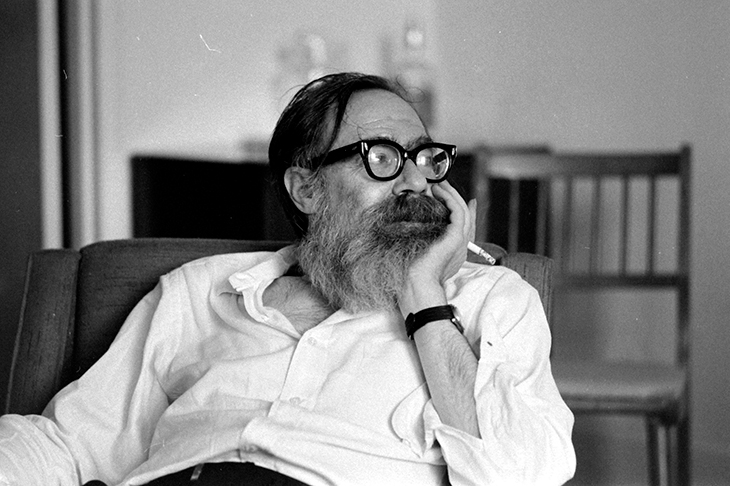‘A matter that hurts me is that I have made many hundreds of people laugh, in various cities, during the last year or so, but not you — and your father is thought to be a wit.’ This was the poet John Berryman to his nearly-estranged son Paul in 1964. The hurt, off-kilter tone and the humble-brag speak to the Berryman one encounters in this capacious Selected Letters.
One of the great extremists of a brilliant generation, which included Robert Lowell, Randall Jarrell and Elizabeth Bishop, Berryman’s entanglement of art and risk, his view of poetry as a ‘terminal activity’ and the artist’s life as one of self-annihilating labour, is present early, and enduringly. In 1936, just graduated from Columbia, Berryman writes to R.P. Blackmur while composing a poem: ‘I am beginning to understand how it drives you mad after a time.’ Here, that’s said more with a willed sense of fellow feeling than despair, but despair would come.
Not for nothing did Berryman include the Book of Job among the reading lists for courses he taught as he bumped around some of the great institutions of America. Only in the final years was he secure, or in funds. First came decades taking a high, persistent toll on his health and self-esteem. Employment was fraught, as was his reputation — to Dwight Macdonald in 1951: ‘Life seems to be an endurance contest without prizes or plan’ — and Berryman was more than ordinarily attuned to prizes.
Acclaim came eventually, many broken limbs, marriages and dryings-out later
He displays from the start an inborn sense of thwartedness, at times in pitiful listings of credentials, at others forlorn repining: ‘If you don’t like “Winter Landscape” or “The Disciple”, I think I had better retire and try archery.’ In truth, the early poems were if anything over-praised and anthologised, despite resembling ‘statues talking like a book’, in Randall Jarrell’s cuttingly apposite phrase. Berryman’s ambition and commitment were monastic, of an up-all-night-for-weeks-straight stripe.
The letters are mostly of interest to the converted: there’s no laying out of the principles of the art. We see Berryman griping, ranting, heartbroken; repetition abounds, of witticisms, of complaints — fascinating to those hooked on his work, but he’s no transcendent corresponder. Nor is there scandal; just one letter, incongruous in its loving isolation, to Chris, the woman who inspired his initially self-suppressed sonnets.
Only rarely does he illuminate his poems, or poetry itself: ‘The development of an organising intellectual power just remains compatible in a few people with the persistence of a child’s capacity for expression.’ Of his own: ‘I don’t write these damned things willingly.’ It dawns on the reader that as well as the trauma of his father’s suicide, when Berryman was a child, the oil in the water of his life was a misconception of his capacities, thinking his encyclopaedic, exhibitionist lyricism was suited for the quieter, less public work of academia: ‘I am it, Dr Dryasdust in person… the man I identify with is Housman, pedantic & remorseless.’
Acclaim came eventually, many broken limbs, marriages and dryings-out later, as did the great poems his self-image required. Having made a breakthrough with a disjointed reverie in which he communed with the Puritan poet Anne Bradstreet, it was his tragicomic Dream Songs which, even while preparing them for publication, Berryman realised would be the enduring work: ‘I don’t count on collecting any fame from these 60 pages but I shn’t be surprised if some of them proved more or less immortal.’
Suicide is a spectre, the reliving of his father’s in adulthood therapy a root cause of animating grief. As early as 1953 he writes to his ex-wife Eileen outlining plans to jump from George Washington Bridge: ‘The vision of whistling air frightens me.’ It’s a go-to when unable to pay alimony or otherwise backed into a corner. He is understanding, too, of others’ death-drives, writing to Adrienne Rich after her husband’s suicide: ‘That act is purely personal, & aggressive’; and to Randall Jarrell’s widow on her husband’s uncertain end: ‘He had iron self-confidence, and he was childlike — neither of them qualities leading to suicide… I cried for Randall’s.’
These moments are stark, but rare; for all his losses Berryman displays a capacity for joy, especially in reminiscence — to Saul Bellow ‘as in the winter of 1953 in Princeton, with the Bradstreet blazing and Augie fleecing away’, or when outlining new obsessions with music, art or a late desire for religious faith.
While we might have lived with less, we should be grateful for this fresh insight into Berryman and his starry, competitive circle, modestly introduced and footnoted. There’s a jolt to the abruptness of the letters’ sudden ceasing. The penultimate, to Paul: ‘I march off into the snow to listen to 18 Honors students.’ Berryman’s final march, to Washington Avenue Bridge, came a month later, on 7 January 1972.






Comments